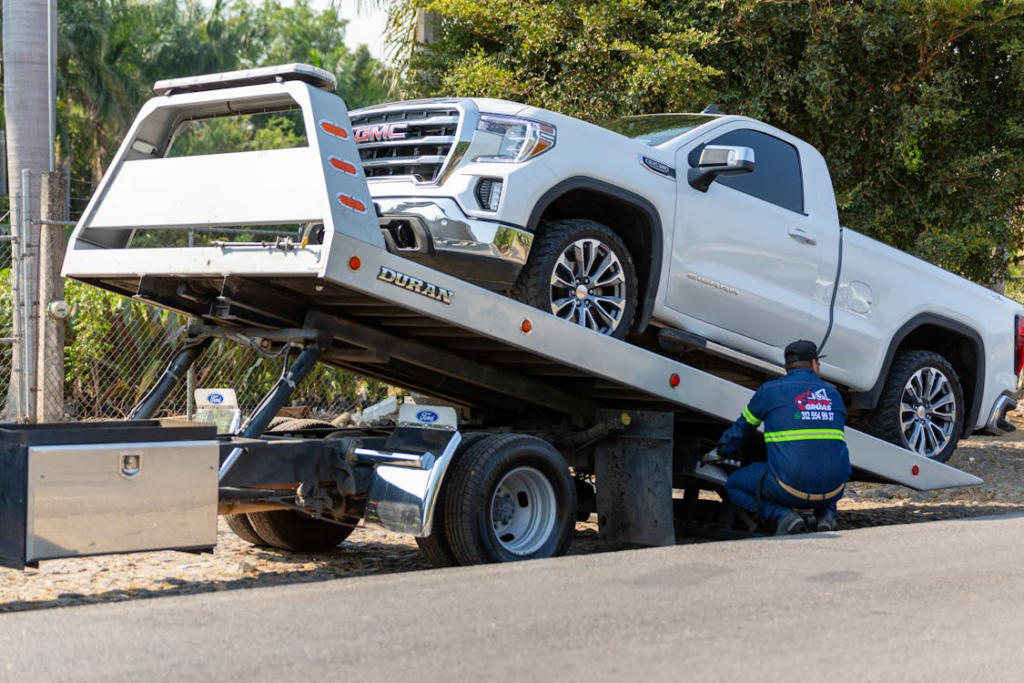
Getting a car bought from an auto dealership or private seller on loan or financing agreement can be exciting. However, failure to keep up with payments as promised in the signed contract can lead to the stressful situation of having your car repossessed or taken back. It helps to know the procedure creditors follow, consumer rights protections around the process, and early options for avoiding repossession – so you prevent the transport and financial crisis of unexpectedly losing your vehicle asset.
What is Car Repossession?
Car repossession refers to a creditor or lender taking back a car from someone who borrowed money to purchase it after they fall behind on making the loan payments as outlined in the signed financing agreement.
Since the car acts as collateral or security on the loan issued to the new owner, failure to pay installment obligations or defaulting means the creditor can lawfully seize the vehicle to recoup losses from the breached financing contract. If needed, the car gets taken back by force to settle unpaid debts. This allows creditors to recover asset value given upfront to buyers lacking the capability now or willingness to meet repayment terms.
Knowing how credit laws govern rightful repossession protocols gives vehicle owners fairness protections even when facing legitimate defaults.
The Car Repossession Procedure
While individual creditor policies vary, lawful repossession processes typically proceed as follows:
- Notice of Default: If a single installment payment is missed or the full payment is not received by the monthly due date, the creditor first issues a written Notice of Default requesting immediate payment settlement.
- Acceleration of Debt (Not Always Applicable): Some credit contracts contain “acceleration clauses,” making the total outstanding loan amount plus interest immediately due once defaults commence. This obligates immediate repayment of the entire loan, not just the missed installments.
- Issuance of Section 129 Notice After consecutive payment defaults exceed common grace periods and any acceleration rights are enforced, the creditor legally demands full repayment failure, which permits repossession using a formal National Credit Act Section 129 Notice. This also explains rights/options.
- Consumer’s Opportunity to Rectify Default or Consult a Debt Counsellor: Per NCA requirements, Section 129 Notices must clearly stipulate reasonable deadlines (usually 10 business days), providing last chances of making late payments before asset repossession advances. The window also allows seeking debt counselor consultation on managing balances.
- Court Order or Consent Order (If Debt Not Rectified): If no payments get made or acceptable arrangements are concluded after the final Section 129 Notice expires, the creditor approaches the Magistrate Court, acquiring a civil warrant authorizing asset repossession forcibly if needed. The Order gets signed by a judge.
- Warrant of Execution Against Property: With a court order granting securing the legal right to reclaim the unpaid financed car serving as collateral, an authorized Warrant of Execution is issued to carry out vehicle confiscation using law enforcement assistance if the consumer refuses a peaceful return.
- Repossession by Sheriff: Accompanied by lawful towing services contracted, court-appointed sheriffs with the warrant in hand take possession of defaulted vehicles against the buyer’s consent if needed, conducting any required inventory audits and itemizing assets retrieved. Defaulters witnessing repossession events must not obstruct this legal process.
- Storage of Repossessed Vehicle: While temporary storage incurring charges becomes the consumer’s liability after losing asset rights, creditors allow brief grace periods for consumers to negotiate voluntary return of vehicles through renewed payment plan commitments before auction sales become inevitable, recouping monies owed.
- Sale in Execution: Assuming the consumer never makes suitable on the financing contract after repossession, the recovered vehicle gets auctioned through public sales processes to third-party bidders, known legally as a Sale in Execution. Auction terms follow court governance with proceeds owed to the creditor plaintiff first.
- Application of Proceeds from the Sale: Funds raised from the sale in the execution auction are initially applied towards the remaining unpaid loan amount. Late fees, interest, legal costs from warrants, and asset recovery will be deducted next. The remaining balances pay creditors ahead of consumers.
- Balance of Debt Settlement or Continuation of Payments: If excess funds still exist after the creditor applies auction proceeds to the court calculations of total outstanding debt, the consumer becomes eligible for receipt of leftover amounts, which legally satisfy debts owed in full absent separate judgments. Shortfalls, however, require consumers to cover personal assets.
While that repayment enforcement sequence suits legitimate defaults, the Credit Act still mandates fair treatment for consumers facing such duress, mainly around reasonable repossession period notices and rights to contest irregular procedures.
Understanding the National Credit Act (NCA) Protections
South Africa’s National Credit Act of 2005 and later Consumer Protection Act of 2008 define legal boundaries and consumer rights through the creditor repossession process, including:
- Right to Written Notices Confirming Defaults: Defaulters have the right to receive written notices clearly articulating missed payment amounts, prescribed deadlines to remedy defaults through repayments, avoiding repossession, options to contest disputed debt amounts, and procedures handling vehicle value auction proceeds. Documents must prove compliant.
- Right to Voluntarily Return Assets Pre-Repo: The law permits defaulting consumers to proactively reach an agreeable settlement by returning vehicles to creditors before more aggressive repossession warrants commence. This avoids court intervention route stresses.
- Right to Redeem Assets Post-Repo: Within strict post-repossession timelines, laws enable defaulting consumers to negotiate voluntary vehicle returns or debt repayment with creditors before assets get auctioned without their consent. This protects ownership.
- Right to Fair Asset Value Estimates: Creditors must furnish their best estimates on expected repossessed vehicle auction value projections when settling debt calculations tied to consumers’ outstanding liability. This forecast sets expectations against court-ruled sales in execution outcomes later.
- Right to Access Repossession Profits: After creditor costs are covered, surplus auction funds from seized vehicle sales rightfully settle towards consumers ahead of creditor profits. Accurate accounting proves crucial in preventing undue loss.
While laws align repossession protocols fairly, proactively avoiding default crises works best for consumers retaining their vehicle assets and financial reputations.
What to Do If You Face Car Repossession
If falling behind on financing obligations, consider these options before an involuntary repossession:
- Contact your lender immediately. Creditors want willing payment compliance more than assets. Communicate hardships transparently and request leniency through installment extensions, partial deferrals, or modified loan terms that work reasonably, given the personal circumstances causing nonpayment. Don’t avoid problems.
- Review your budget: Get clear on total income and expenses. Look for cuttable spending allowing allocation towards existing vehicle debt above surrendering your movable asset, which has lost equity already. Downgrade conditions if it secures ownership.
- Consider selling the car voluntarily: If budgetary room remains impossible and default continues, take control by selling the financed vehicle yourself outright through private buyer deals before unceremonious repos arrive at your employer or home unannounced. This lets salvage equity for future reliable car buys compliant with affordable budgets.
- Seek debt counseling. Nonprofit debt counselors help construct actionable budgets, creatively renegotiate favorable terms across multiple debts through creditor negotiations, or structure legal personal administration agreements granting court protections shielding assets during repayment rehabilitation. Don’t struggle alone silently.
While best efforts to keep financing obligations avoid lawful seizures, it still helps to understand the limitations of how repossession procedures unfold.
The Impact of Car Repossession
Beyond the difficult loss of mobility forcing reliance on public transport, repossessions also commonly create:
- Negative Credit Rating: Default listings stay on credit records for years, hampering additional financing eligibility beyond difficulty securing replacement vehicle arrangements essential for transport independence. Expect higher rates, too.
- Difficulty Securing Financing: Beyond higher credit costs, approved future loans are only granted under strict conditions or with upfront deposits given default history. This adds costs later when acquiring assets again.
- Loss of Transportation: The mobility freedom vehicles provide for securing jobs, commutes, family errands, and basic life needs disappears, forcing major adjustments until other wheeled solutions become affordable.
- Emotional Stress: The financial duress, family tension, employment disruption, and feelings of failure through a repossession ordeal cause deep emotional anxiety, needing therapy in some cases. Major lifestyle shifts loom.
While proper budgeting avoids the vehicle vulnerabilities and creditor enforcement repossessing cars entails, it helps know consumer fairness protections govern hard-earned asset seizures through regulated car repossession processes if all prevention fails. Seek knowledgeable counsel navigating options.












